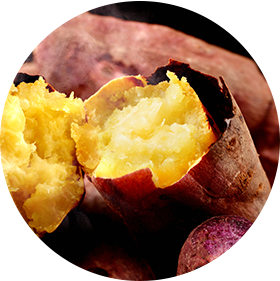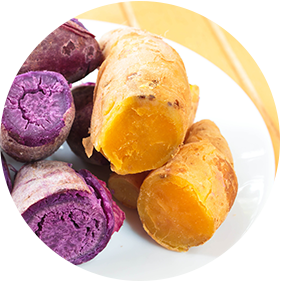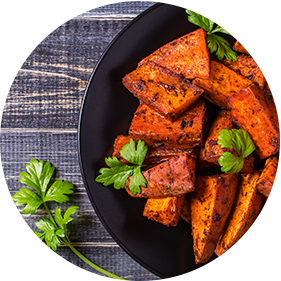
Ingredient of the month: Sweet Potatoes
From savoury soups to desserts, creamy-textured sweet potatoes not only add its distinct sweetness to dishes but also offers numerous health benefits, making it a prime ‘superfood’.

 |
|

These colourful gems offer some pretty impressive health perks.
Here are six sweet benefits of sweet potatoes.

Boosts immunity
Sweet potatoes are super rich in beta-carotene, which is a major antioxidant, along with vitamin C and B complex vitamins, iron, and phosphorus. All these nutrients help in strengthening immunity and defends your body from a wide variety of conditions.
Controls diabetes
Despite its sweetness, sweet potatoes are low on the glycemic index scale. Recent research suggests they reduce incidences of low blood sugar and insulin resistance in people with diabetes.


Improves digestion
Eat healthy fats but limit saturated fat as it raises bad cholesterol levels (LDL) which can clog your arteries. Switch to semi-skimmed milk, low-fat dairy foods, fresh fruits and vegetables, choose lean cuts of meats and opt for steaming or grilling methods instead of frying.
Fights cancer
According to a study conducted by the Harvard School of Public Health's Department of Nutrition, diets richin beta-carotene like sweet potatoes may help protect against prostate cancer. It may also protect against colon, intestinal and other cancers.


Good for your vision
A study by Food & Nutrition Research found that purple sweet potatoes in particular contain a specific group of antioxidants which can be beneficial to the eyes. Rich in vitamin A, sweet potatoes can also restore blurred vision.
Treats arthritis
Beta-carotene, magnesium, zinc, and vitamin B complex make sweet potatoes a highly important food source for managing arthritis. The water in which sweet potatoes are boiled can also be applied externally on joints to ease the associated pain of arthritis


Sweet potatoes are versatile, filling and packed with goodness. Here are some quick and healthy cooking methods that bring out the best of sweet potatoes.

BOIL
Boiling sweet potatoes is not only the simplest way of cooking them but also retains the most nutrients and antioxidant properties of the vegetable.
Simply boil diced sweet potatoes in a pot of water with a pinch of salt until tender and enjoy it plain or topped with non-dairy yogurt or mash them with a dash of cinnamon. Don’t mind the skin? – Get an extra boost of fiber and potassium if you eat them with the skin on.
STEAM
Prepare steamer, bring water to a boil then reduce to a simmer and steam sweet potatoes until tender, for approximately 20 minutes. To add a dash of Asian flavour, you can pair the steamed sweet potatoes with a vinaigrette made of chopped green onion, rice wine vinegar, garlic and a dash of fish sauce.


ROAST
Cut sweet potatoes into wedges, toss them with extra virgin olive oil and honey and put it in the oven for 25 to 30 minutes. The sweet potatoes get golden and caramelized on the outside, and stays soft and sweet on the inside – the perfect healthy snack or side dish.
GRILL
Slice the sweet potatoes into long strips, drizzle a little olive oil and toss on the grill. Top it with fresh avocados and boiled eggs with a sprinkle of chia seeds for a truly nutritious and delicious meal.

How sweet it is for your health to eat sweet potatoes! Get your power load of vitamins, minerals, fibre and more with this super vegetable. Eat them as the starchy portion of your meal but make sure you cook them right in order to reap the most nutritional benefits.

While there aren't any severe health problems associated with sweet potatoes, they are high in vitamin A and overconsumption can cause your skin and nails to turn orange.
According to the Mayo Clinic, people with a history of kidney stones may want to avoid eating too many sweet potatoes, as the vegetable contains oxalate, which contributes to the forming of calcium-oxalate kidney stones.
The above articles are intended for informational purposes only. AIA accepts no responsibility for loss, which may arise from reliance on information contained in the articles.
The above articles are intended for informational purposes only. AIA accepts no responsibility for loss which may arise from reliance on information contained in the articles.
https://www.lungevity.org/support-survivorship/get-connected/blog/top-10-lung-cancer-myths-common-misconceptions-about-lung
http://www.e-mjm.org/2016/v71s1/lung-cancer-research.pdf
https://www.patientpower.info/series/lung-cancer-infographic
http://today.mims.com/topic/lung-cancer-awareness-month-2016--statistics-reveal-staggering-extent-of-prevalence
http://www.mens-health.com.my/health/5-facts-about-lung-cancer